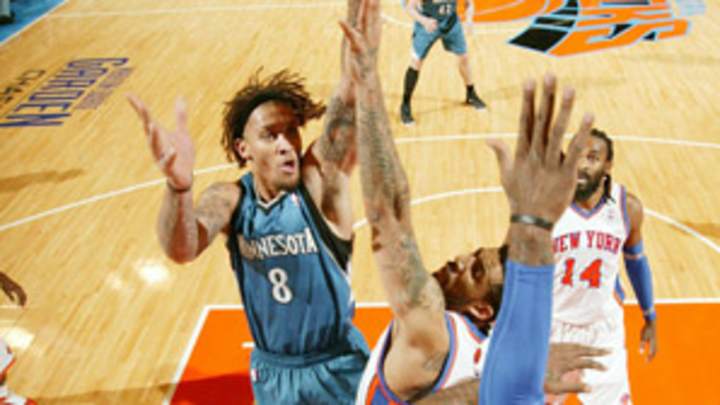Beasley 2.0 emerges with Wolves


NEW YORK -- It was the Timberwolves' first offensive possession of the game Monday and Michael Beasley didn't hesitate. He caught the pass from Luke Ridnour on the right elbow and saw that Danilo Gallinari was shading him to his right, daring him to drive with his off hand.
Force him right. That was the scouting report on Beasley, written in bold, blue marker on the white board in the Knicks' locker room before the game. Didn't work. With a quick first step, Beasley had Gallinari at his hip, his long braids grazing Gallinari's face as he elevated for an easy layup.
Meet Michael Beasley, version 2.0. This is not the same Beasley who flamed out after two seasons Miami. That Beasley frustrated teammates and coaches alike with his ability to dominate some stretches and completely disappear in others. That Beasley was seduced by the trappings of the NBA lifestyle -- a lifestyle that bottomed in August 2009, when he checked into rehab after a series of tweets that suggested Beasley was contemplating suicide.
This Beasley is different. His life is in order, he says. His game? That's definitely picked up. Through 19 games of his first season with Minnesota, Beasley is averaging 21.8 points on 47.7 percent shooting. As the centerpiece of the Wolves' triangle offense, Beasley has found a comfort level that eluded him in Miami.
"The triangle is a complex offense, but once you get it, it becomes second nature and it's pretty easy," Beasley said. "I haven't got it down pat yet, but so far, so good."
Minnesota has shown great faith in Beasley. The Wolves shifted him from power forward to small forward, where Beasley has been able to take advantage of smaller players who have trouble standing up to his 6-foot-10, 235-pound frame. Coach Kurt Rambis has given Beasley a permanent green light and encouraged him to be aggressive offensively.
"I didn't have as much freedom in Miami to shoot or dribble," Beasley said. "I was pretty much told to run the offense and get out of the way. Here, I don't want to say I can shoot anytime I want, but I have a large variety of shots. The ball comes to me a lot more. A lot of people haven't showed that same type of confidence. Coach believed in me for whatever reason. I'm not going to let him down."
Early on, Rambis didn't know what to expect from Beasley. He didn't come with a hefty price tag -- two second-round picks -- but Rambis was charged with rebuilding a young team that didn't need any distractions. And the reports he received on Beasley were mixed. But as the coach of a team that had fallen on hard times, he made it simple: You give us a shot and we'll give you one, too.
"We want players to judge us for us, not what has happened in other situations with coaches or teams," Rambis said. "Just come in and look at our situation and judge us for us and we'll judge you on what you do for us."
Beasley has become Minnesota's go-to scorer. He has led the Wolves in scoring a team-high 10 times. His three-point percentage has spiked from 27.5 percent last season to 41.5 percent. In games Beasley has scored 20-plus points, the Wolves are 4-6; when he goes for fewer than 20, they are 0-9.
He has emerged as a leader, too. Rambis calls Beasley's personality "exceptional" and says the 21-year-old "keeps the team together." In the first quarter against New York, Beasley barked at Amar'e Stoudemire from across the court after the Knicks' big man bumped Minnesota point guard Sebastian Telfair after the whistle.
"He loves to play," Rambis said. "He absolutely loves the game of basketball. You can see the potential in him."
Indeed, the Timberwolves believe they are just scratching the surface on Beasley's skills. Rambis believes that once Beasley settles into playing small forward, the advantages for him will be everywhere.
"He hasn't really exploited all the post-up opportunities playing against a smaller player," Rambis said. "He can do so many different things on different spots on the floor, and because he can put the ball on the floor, everything looks like an advantage to him."
As for Beasley, he says he has put Miami in his rearview mirror. He's not motivated by anger or the burning desire to show the Heat they made a mistake. He just wants to get back to being the player who was a McDonald's All-American in high school and a first team All-American at Kansas State. He just wants to play.
"I really don't care [about Miami]," he said. "I'm not out to prove anybody wrong. I just want to play basketball. I just want to win."
